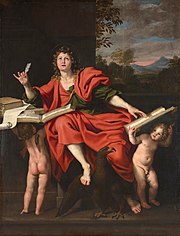
Back Dissipel vir wie Jesus baie lief was Afrikaans التلميذ المحبوب Arabic Възлюбеният ученик Исусов Bulgarian Deixeble que Jesús estimava Catalan Lieblingsjünger German Ο μαθητής ον ηγάπα ο Ιησούς Greek El discípulo a quien Jesús amaba Spanish Opetuslapsi, jota Jeesus rakasti Finnish Disciple que Jésus aimait French Murid yang Yesus kasihi ID
| Part of a series of articles on |
| John in the Bible |
|---|
 |
| Johannine literature |
| Authorship |
| Related literature |
| See also |
The phrase "the disciple whom Jesus loved" (Ancient Greek: ὁ μαθητὴς ὃν ἠγάπα ὁ Ἰησοῦς, romanized: ho mathētēs hon ēgapā ho Iēsous) or, in John 20:2; "the other disciple whom Jesus loved" (τὸν ἄλλον μαθητὴν ὃν ἐφίλει ὁ Ἰησοῦς, ton allon mathētēn hon ephilei ho Iēsous), is used six times in the Gospel of John,[1] but in no other New Testament accounts of Jesus. John 21:24[2] states that the Gospel of John is based on the written testimony of this disciple.
Since the end of the first century, the beloved disciple has been commonly identified with John the Evangelist.[3] Scholars have debated the authorship of Johannine literature (the Gospel of John, Epistles of John, and the Book of Revelation) since at least the third century, but especially since the Enlightenment. The authorship by John the Apostle is rejected by many modern scholars,[4][5] but not entirely.[6] There is a consensus among Johannine scholars that the beloved disciple was a real historical person,[7] but there is no consensus on who the beloved disciple was.[8]
- ^ John 13:23, John 19:26, 20:2, John 21:7, John 21:20
- ^ John 21:24
- ^ Eusebius of Caesarea, Ecclesiastical History Book iii. Chapter xxiii.
- ^ Harris, Stephen L. (1985). Understanding the Bible: a Reader's Introduction (2nd ed.). Palo Alto: Mayfield. p. 355. ISBN 978-0-87484-696-6.
Although ancient traditions attributed to the Apostle John the Fourth Gospel, the Book of Revelation, and the three Epistles of John, modern scholars believe that he wrote none of them.
- ^ Kelly, Joseph F. (1 October 2012). History and Heresy: How Historical Forces Can Create Doctrinal Conflicts. Liturgical Press. p. 115. ISBN 978-0-8146-5999-1.
- ^ Wagner, Richard; Helyer, Larry R. (2011). The Book of Revelation For Dummies. John Wiley & Sons. p. 26. ISBN 9781118050866.
other contemporary scholars have vigorously defended the traditional view of apostolic authorship.
- ^ Neirynck, Frans (1991). Evangelica II: 1982-1991 : Collected Essays. Uitgeverij Peeters. ISBN 9789061864530.
- ^ Matkin, J. Michael (2005). The Complete Idiot's Guide to the Gnostic Gospels. Penguin. ISBN 9781440696510.
but there is no consensus as to the Beloved Disciple's actual identity